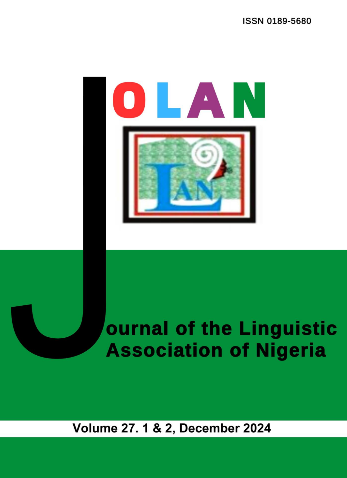Language and Cultural Barrier: Implication for Conflict Resolution in Nigeria
Keywords:
language, cultural barriers, conflict and conflict resolution, contingency theoryAbstract
Conflict remains a global phenomenon. It is not a particular ethnic groups or society’s challenge. Conflict takes different forms and sizes; hence the ways of resolving such conflict differs based on language and cultural setup of a particular society. Resolving conflict is a huge task influenced by factors such as language and culture. The paper primarily seeks to highlight how language and culture are instrumental in conflict and conflict resolution. The colossal loss of both human and material resources in Nigeria is mostly the function of both linguistic and intra/inters ethnic conflict. The paper adopts contingency theory of strategic conflict management for discussions. The paper explains the concept of culture, conflict and conflict resolution, established a strong interface between cultural differences and conflict. It posits that if conflict must be resolved in Nigeria, linguistic and cultural diversity must be taken into consideration in order to bring about system balance as people’s worldview is rooted in their culture. Also, the need to employ the language of nativity in resolving conflict is highlighted. The paper concludes that an exploration of the language and the culture of the people remain effective tools for resolving conflict. It recommends that conflict resolution methods like mediation, avoidance, collaboration, etc should bring cultural and linguistic factors into thought and deliberation.
References
Adejimola, A.S (2009). ‘Language and Communication in Conflict Resolution’ Journal of Law and Conflict Resolution. 1 (1), 001-009
Anyabuike, C (2015). Translation, Culture and Conflict Resolution in Nigeria. Miss
Balarabe , M.A (2009) “ The Propaganda Role of Language in Industrial Dispute: The Case of Nigerian Labour Congress Strike of June 2007” Zaria Journal of Linguistics and Literary Studies, Vol4, p10
Bateman, & Zeithalml, (1993) Management: Function and Strategy. @nd Ed, Illinois: Irwin
Butter, S. (2002) Language, Literature, Culture and their meeting place in the dictionary. Melbourne: Language Australia.
Chambers 21st Century Dictionary (Revised Edition). Chambers Harrap Publishers, 1999 Communication, New York: Prentice Hall Regents
Fisher, & Keashly, (1988) Third Party Intervention in Intergroup Conflict: Consultation is not Mediation. Negotiation Journal, Vol.4, Issue4. Pages 381-393
Fisher, R.J (1993) Contingency Theory of Strategic Conflict Management. A Decade of Theory Development, Discovery and Dialogue: Journal of Peace Research.
Froman,C & Froman, L.A (1992) Language and Power. Atlantic Highlands, NJ: Humanities Press International
Fromkin, V. Rodmam, R and Hymes, N (2003) An Introduction to language. 8th ed. USA. Thomas Wordsworth
Heitle, S. (2016) Resolution, not conflict. Journal of Education and Practice. Vol.7, No.28. 146. Retrieved from www.psychologytoday 16/4/2020
Huntington, S. (1996). The Classes of Civilizations and the Remarking of World Order. New York: Simon & Schuster.
Kroeher, A. & Kluckhomhn (1962) Culture: A Critical Review of Concepts and Definitions. Cambridge: Peabody Museum.
LeBaron, M (2003). "Culture and Conflict." Beyond Intractability. Eds. Guy Burgess and Heidi Burgess. Conflict Information Consortium, University of Colorado, Boulder. Posted: July 2003 <http://www.beyondintractability.org/essay/culture-conflict>
Leonard P & LAW,E. F. (2004) Culture Language and online Dispute Resolution Victoria: RMIT University and Dispute settlement Centre.
Levine, D. R. & M. B. Adelman (1993) Beyond Language: Cross Cultural Communication. New York: Prentice Hall Regents
Miller, C. (2003). A Glossary of Terms and Concepts in Peace and Conflict Studies. Geneva: University of Peace.
Nwolise, O. (2003), “War-Making, Peace-Making and Conflict Resolution in Africa”, In Harunah, H., Nwolise, O. and D. Oluyemi-Kusa, A Guide To Peace Education and Peace Promotion Strategies In Africa, Vol. 1, The Nigerian Approach, Lagos: Perfect Printers Ltd.
Nzeakor, N. Onuekusi, C and Ukaegbu, U (2017) Language and Conflict Resolution: A Psychoanalytic Study of Chimamanda’s Purple Hibiscus.
Mss Pang, A. Jin, Y,& Cameron, G.T (2007) The Handwork of Crisis Communication (eds) in W.T. Coombs and S.J. Holladay), Wiley Blackwell, Oxford.
Rahim, M. A. (2002) “Toward a Theory of Managing Organizational Conflict”. International Journal of Conflict Management, vol. 13, no. 3, pp. 206-235
Rue and Byarrs (1992) Management kills and Application. Boston: Irwin
Sagimo P.O, (2002) Management Dynamics; towards efficiency, effectiveness, competence and productivity East Africa Education Publisher: Nairobi: EAEP ISBN: 9966-46-816-1
Sapir. E. (1941). Language, Culture and Personality. Menasha; Sapir Memorial Publishers
Schwartz, S.H. (2000) Value consensus and Importance: Across National Study. Journal of Cross -Cultural Psychology, 4:455-497.
Shomi, K. (2010) The Role of Cultural Diversity in Conflict Resolution in Africa. http://www.moniitor.upeace.org/archieve.cfm?idarticle=747
Thriveni, Ms.C (2005) Cultural Elements in Translation the Indian Perspective. http://www.valuebasedleadershipjournal.com/issues/vol4issues2/conflict.
Tidwell A.C. (1998). A Critical Assessment of Conflict Resolution. London UK: Continuum.
Ting- Toomey, S. & Oetzel I.G (1999) Managing Intercultural Conflict Effectively.
Thousand Oaks, CA: Sagit Triands, H. (1995). Individualism and Collectivism. Boulder: West View Press.














